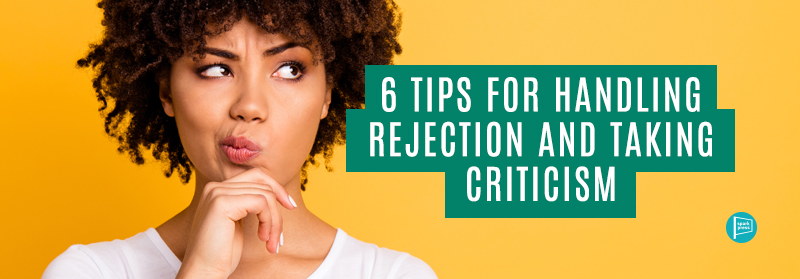
Let’s face it: If you’re in a creative career, it can seem like rejection sits around every corner waiting for you to stop by and say hello. Some criticism and rejection will have you reaching for a safety blanket, wishing you took on another profession. Others can be gentle, letting you down in a way that keeps your ego intact. Authors like Margaret Atwood understands this all too well. When her most notable work The Handmaids Tale was heavily criticized, she said this, “If you believe the good reviews, you’re also going to have to believe the bad reviews.” Although criticism and rejection may be inevitable, growing a thick skin doesn’t happen overnight. Find out below just what to do when rejection and criticism get the best of your writing or creative work.
1. Check Your Mental Health
Whether it’s from a publisher, an editor, writers, or readers, rejection and criticism can feel like a punch to the gut. The worst of it can be self-criticism. No matter where it is from, you might find yourself internalizing the feedback. While this may be easier said than done, take a step back and check in on your mental health. Too much self-hate is detrimental. Therefore, if you end up falling down a rabbit hole of doubt and giving up on your passion for writing, think positive. Remember, most rejection and criticism are not a personal reflection of the creator, but an opinion on the work created. The value of your writing is not defined by you.
2. Know the Difference
Rejection is very clear; a firm “no” from a publisher, an editor, or a company. Sometimes the no will come without any feedback or response at all, leaving you to wonder. But often, rejection comes right after the criticism is given. Criticism is not always a clear no. It comes in a few forms like constructive or destructive. When it’s constructive, it is helpful and gives feedback that provides actionable suggestions that are specific. When it isn’t, it will offer little to no useful suggestions.
3. Find the Beauty in the Criticism
Now that the air is back in your lungs and your confidence is slowly beginning to return, learn to accept the feedback and try to find the silver lining in each one. Because, believe it or not, rejection and criticism can make you a great writer. Think of it not as a choice but as a necessity. While not every criticism or rejection will offer nuggets you can take away, some will, so embrace them. And remember, the secret is, take what can genuinely help your writing and leave the rest.
4. To Respond or Not to Respond
When your emotions are high, the urge to respond can feel strong. However, you should resist responding when those feelings are heightened. Truman Capote also embraced this mentality. He said, “there is one piece of advice I strongly urge: never demean yourself by talking back to a critic, never.” If you do choose to respond, remember to thank them for the feedback, focus on the facts of the criticism, and ask for suggestions towards improvement.
5. Keep Casting the Net
You became a writer or a creative architect because you had a story to tell, and you enjoyed writing. Rejection or criticism should not stop you. Whether it’s your first rejection or your tenth, keep putting your work out. The opinions of other authors, editors, and publishers should only motivate you to adjust your craft, not end it. Find different activities to remind yourself of why you love writing and creating. One trick is to go back to what sparked your creativity in the first place. You may find a renewed interest or an entirely new direction.
6. Join a Community
If you have a group of friends who are writers, then you are on the right track. If not — consider joining a community. Online writing communities improve your writing and even prepare you for the criticism and rejection that may come your way. They offer a chance to determine if you should rework a character, define a stronger plot, or discover a newer audience. Other benefits of writing groups include accountability for finishing abandoned drafts and learning the different routes for working through the publishing process. The most important thing about any community is the output—the more you put in, the more comes out.

Leave A Comment